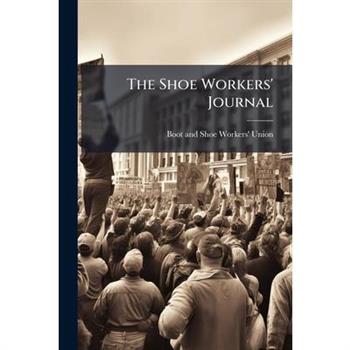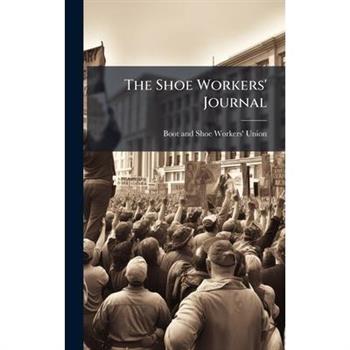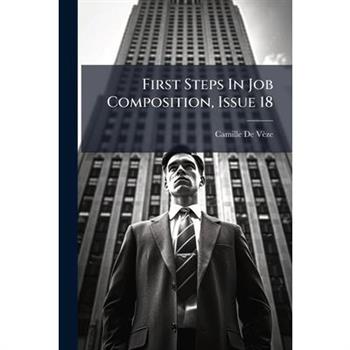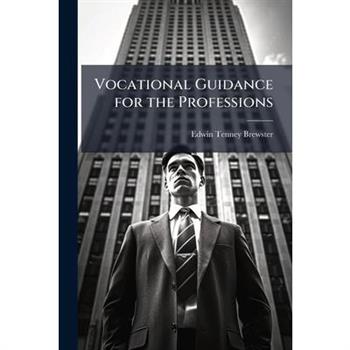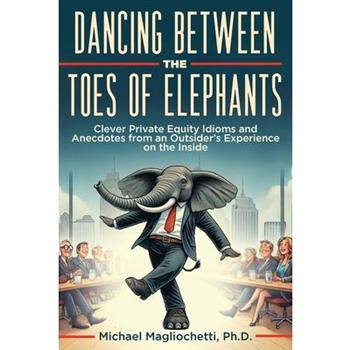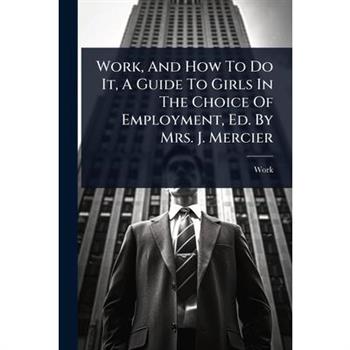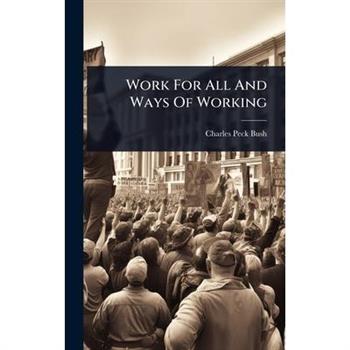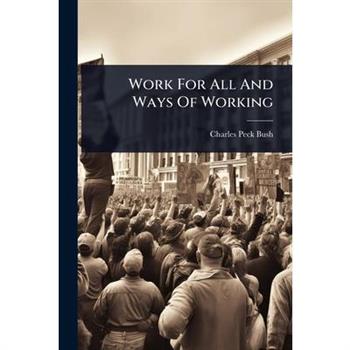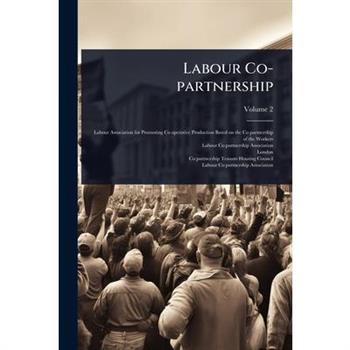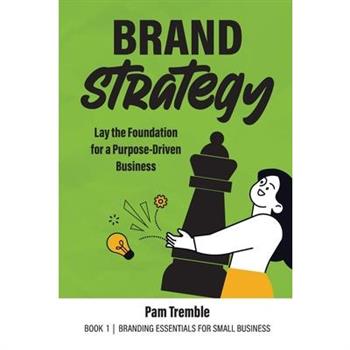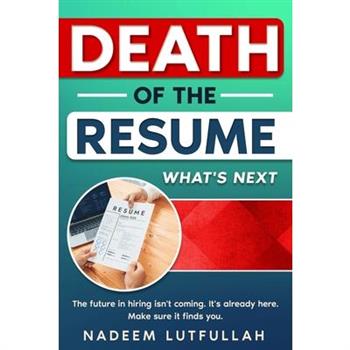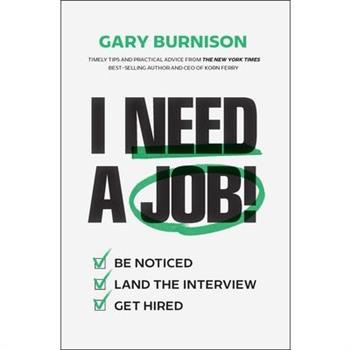Business Correspondence ...
Business Correspondence, Volume 1, provides instruction on effective business communication. This comprehensive guide from 1911 covers various aspects of letter writing, including structure, tone, and style. Focusing on practical application, the book uses examples of model letters for different business scenarios. A valuable resource for students and professionals, "Business Correspondence" emphasizes clarity and conciseness in crafting effective messages. Its timeless advice on professional communication remains relevant in today's business environment, offering readers insights into the art of written communication.This work has been selected by scholars as being culturally important, and is part of the knowledge base of civilization as we know it. This work was reproduced from the original artifact, and remains as true to the original work as possible. Therefore, you will see the original copyright references, library stamps (as most of these works have been housed in our most important libraries around the world), and other notations in the work.This work is in the public domain in the United States of America, and possibly other nations. Within the United States, you may freely copy and distribute this work, as no entity (individual or corporate) has a copyright on the body of the work.As a reproduction of a historical artifact, this work may contain missing or blurred pages, poor pictures, errant marks, etc. Scholars believe, and we concur, that this work is important enough to be preserved, reproduced, and made generally available to the public. We appreciate your support of the preservation process, and thank you for being an important part of keeping this knowledge alive and relevant.
Labor and Porcelain in Japan
"Labor and Porcelain in Japan" offers a historical snapshot into the labor practices associated with the porcelain industry in Japan during the late 19th century. Written by Thomas B. Van Buren, the book provides insights into the working conditions, skills, and economic factors influencing the production of Japanese porcelain. It explores the intricate relationship between labor and craftsmanship, shedding light on a significant aspect of Japan's industrial development and its contribution to global trade. This work is invaluable for researchers and enthusiasts interested in economic history, labor studies, and the cultural significance of Japanese ceramics.This work has been selected by scholars as being culturally important, and is part of the knowledge base of civilization as we know it. This work was reproduced from the original artifact, and remains as true to the original work as possible. Therefore, you will see the original copyright references, library stamps (as most of these works have been housed in our most important libraries around the world), and other notations in the work.This work is in the public domain in the United States of America, and possibly other nations. Within the United States, you may freely copy and distribute this work, as no entity (individual or corporate) has a copyright on the body of the work.As a reproduction of a historical artifact, this work may contain missing or blurred pages, poor pictures, errant marks, etc. Scholars believe, and we concur, that this work is important enough to be preserved, reproduced, and made generally available to the public. We appreciate your support of the preservation process, and thank you for being an important part of keeping this knowledge alive and relevant.
Thrive and Shine
You don't have to know exactly where you're going to start moving forward.Thrive and SHINE meets you where you are-and helps you grow from there.Whether you're stepping into your first professional role or navigating a new chapter, this book is your empowering guide to building a career that reflects who you are, not just what you do.You don't have to fit a mold or turn up the volume to stand out. The key is showing up as you.Written especially for early-stage professionals navigating the pressures of high expectations, new environments, and real-world uncertainty, Thrive and SHINE offers the clarity, encouragement, and practical tools you actually need to succeed on your own terms.Inside, You'll Discover: How to blend instinct and data to make decisions you actually trustWhat it takes to grow without burning out-and how to spot the warning signs earlyWhy setbacks are part of the plan-and how to turn them into your next big moveHow to use curiosity and risk to unlock real momentumThe feedback strategies and connections that will fuel your glow-up-not drain your energyPlus: reflection prompts, exercises, and real-world tools to help you shine from the startWhether you're starting out, starting over, or simply ready to stop playing small, Thrive and SHINE helps you build a career that's sustainable, intentional, and uniquely yours.Your path doesn't have to look like anyone else's. But it should feel right to you.Let's make that happen.Ready to shine and thrive? Then scroll up and click "Add to Cart" right now!
Thrive and Shine
You don't have to know exactly where you're going to start moving forward.Thrive and SHINE meets you where you are-and helps you grow from there.Whether you're stepping into your first professional role or navigating a new chapter, this book is your empowering guide to building a career that reflects who you are, not just what you do.You don't have to fit a mold or turn up the volume to stand out. The key is showing up as you.Written especially for early-stage professionals navigating the pressures of high expectations, new environments, and real-world uncertainty, Thrive and SHINE offers the clarity, encouragement, and practical tools you actually need to succeed on your own terms.Inside, You'll Discover: How to blend instinct and data to make decisions you actually trustWhat it takes to grow without burning out-and how to spot the warning signs earlyWhy setbacks are part of the plan-and how to turn them into your next big moveHow to use curiosity and risk to unlock real momentumThe feedback strategies and connections that will fuel your glow-up-not drain your energyPlus: reflection prompts, exercises, and real-world tools to help you shine from the startWhether you're starting out, starting over, or simply ready to stop playing small, Thrive and SHINE helps you build a career that's sustainable, intentional, and uniquely yours.Your path doesn't have to look like anyone else's. But it should feel right to you.Let's make that happen.Ready to shine and thrive? Then scroll up and click "Add to Cart" right now!
First Steps In Job Composition, Issue 18
First Steps In Job Composition, Issue 18 by Camille De V癡ze offers insightful guidance for navigating the evolving landscape of employment. This issue delves into the principles of job composition, providing readers with essential knowledge on how roles are being reshaped by technological advancements and emerging trends. The book explores the impact of automation and data science on traditional job structures, offering strategies for adapting to these changes and preparing for the future of work.Whether you are a student, a recent graduate, or a seasoned professional, this book provides practical advice and actionable insights to help you understand and thrive in the modern job market. Discover the key elements of job composition and gain a competitive edge in your career journey.This work has been selected by scholars as being culturally important, and is part of the knowledge base of civilization as we know it. This work was reproduced from the original artifact, and remains as true to the original work as possible. Therefore, you will see the original copyright references, library stamps (as most of these works have been housed in our most important libraries around the world), and other notations in the work.This work is in the public domain in the United States of America, and possibly other nations. Within the United States, you may freely copy and distribute this work, as no entity (individual or corporate) has a copyright on the body of the work.As a reproduction of a historical artifact, this work may contain missing or blurred pages, poor pictures, errant marks, etc. Scholars believe, and we concur, that this work is important enough to be preserved, reproduced, and made generally available to the public. We appreciate your support of the preservation process, and thank you for being an important part of keeping this knowledge alive and relevant.
The Shoe Workers' Journal
The Shoe Workers' Journal, published by the Boot and Shoe Workers' Union, offers a valuable glimpse into the world of American labor at the turn of the 20th century. This historical journal provides insights into the issues, debates, and organizing efforts of shoe workers during a pivotal era of industrialization and labor activism. It presents primary source material related to working conditions, wages, union strategies, and the broader social and economic context of the time. Researchers and anyone interested in labor history will find this journal an invaluable resource for understanding the challenges and triumphs of the American labor movement.This work has been selected by scholars as being culturally important, and is part of the knowledge base of civilization as we know it. This work was reproduced from the original artifact, and remains as true to the original work as possible. Therefore, you will see the original copyright references, library stamps (as most of these works have been housed in our most important libraries around the world), and other notations in the work.This work is in the public domain in the United States of America, and possibly other nations. Within the United States, you may freely copy and distribute this work, as no entity (individual or corporate) has a copyright on the body of the work.As a reproduction of a historical artifact, this work may contain missing or blurred pages, poor pictures, errant marks, etc. Scholars believe, and we concur, that this work is important enough to be preserved, reproduced, and made generally available to the public. We appreciate your support of the preservation process, and thank you for being an important part of keeping this knowledge alive and relevant.
The Shoe Workers' Journal
The Shoe Workers' Journal, published by the Boot and Shoe Workers' Union, offers a valuable glimpse into the world of American labor at the turn of the 20th century. This historical journal provides insights into the issues, debates, and organizing efforts of shoe workers during a pivotal era of industrialization and labor activism. It presents primary source material related to working conditions, wages, union strategies, and the broader social and economic context of the time. Researchers and anyone interested in labor history will find this journal an invaluable resource for understanding the challenges and triumphs of the American labor movement.This work has been selected by scholars as being culturally important, and is part of the knowledge base of civilization as we know it. This work was reproduced from the original artifact, and remains as true to the original work as possible. Therefore, you will see the original copyright references, library stamps (as most of these works have been housed in our most important libraries around the world), and other notations in the work.This work is in the public domain in the United States of America, and possibly other nations. Within the United States, you may freely copy and distribute this work, as no entity (individual or corporate) has a copyright on the body of the work.As a reproduction of a historical artifact, this work may contain missing or blurred pages, poor pictures, errant marks, etc. Scholars believe, and we concur, that this work is important enough to be preserved, reproduced, and made generally available to the public. We appreciate your support of the preservation process, and thank you for being an important part of keeping this knowledge alive and relevant.
First Steps In Job Composition, Issue 18
First Steps In Job Composition, Issue 18 by Camille De V癡ze offers insightful guidance for navigating the evolving landscape of employment. This issue delves into the principles of job composition, providing readers with essential knowledge on how roles are being reshaped by technological advancements and emerging trends. The book explores the impact of automation and data science on traditional job structures, offering strategies for adapting to these changes and preparing for the future of work.Whether you are a student, a recent graduate, or a seasoned professional, this book provides practical advice and actionable insights to help you understand and thrive in the modern job market. Discover the key elements of job composition and gain a competitive edge in your career journey.This work has been selected by scholars as being culturally important, and is part of the knowledge base of civilization as we know it. This work was reproduced from the original artifact, and remains as true to the original work as possible. Therefore, you will see the original copyright references, library stamps (as most of these works have been housed in our most important libraries around the world), and other notations in the work.This work is in the public domain in the United States of America, and possibly other nations. Within the United States, you may freely copy and distribute this work, as no entity (individual or corporate) has a copyright on the body of the work.As a reproduction of a historical artifact, this work may contain missing or blurred pages, poor pictures, errant marks, etc. Scholars believe, and we concur, that this work is important enough to be preserved, reproduced, and made generally available to the public. We appreciate your support of the preservation process, and thank you for being an important part of keeping this knowledge alive and relevant.
Quarterback
Play the corporate game. Win on your terms. Lead like a quarterback.In Quarterback: An Immigrant's Guide to Corporate North America, award-winning Chartered Professional Accountant (CPA) and Enterprise Risk Management Leader Nadine Niba delivers a bold, honest, and deeply informed playbook for immigrants looking to thrive in Corporate North America.Drawing from over a decade of experience in the corporate world and mentoring immigrants in their numbers, Nadine offers a rare blend of personal stories, strategic insights, and hard-earned lessons that speak directly to the realities immigrants face-often silently.Every chapter is shaped by the lived experiences of those navigating unfamiliar systems, overcoming invisible barriers, and striving to build meaningful careers in a new country.Through the lens of an elite quarterback, calm under pressure, visionary, and always one step ahead, Quarterback equips readers to lead their careers with clarity, confidence, and purpose. From decoding unspoken rules and building influence to mastering office politics, negotiating your worth, and leaving a legacy, Nadine uses the metaphor of an elite quarterback; sharp, strategic, and composed under pressure to guide readers through the complex landscape of corporate North America.Quarterback is more than a career guide. It is a call to lead with purpose, vision, and confidence.It explores the complexities of workplace dynamics to mastering self-advocacy, negotiating your worth, and building lasting influence.Whether you are new to the workforce, restarting your career in a new country, or seeking your next promotion, this book offers an honest perspective tailored to the unique challenges and strengths of the immigrant experience.Inside, you will discover: - Essential traits every corporate "quarterback" must develop- The most common but overlooked career mistakes immigrants make and how to avoid them- How to navigate bias, imposter syndrome, and cultural disconnects without shrinking- Why survival jobs are valuable and how to turn them into springboards- Real-world strategies to build your network, find sponsors, and get promoted- How to pursue success without compromising your identity and lift others as you riseEnriched with insights from business thought leaders as well as timeless biblical principles, Quarterback is more than a career guide.it is a powerful manifesto for immigrant professionals who are ready to own their voice, shape their narrative, and lead with intention.This is not just a book. This is your game plan for greatness.
Quarterback
Quarterback: An Immigrant's Guide to Corporate North AmericaBy Nadine NibaPlay the corporate game. Win on your terms. Lead like a quarterback.In Quarterback: An Immigrant's Guide to Corporate North America, award-winning Chartered Professional Accountant (CPA) and Enterprise Risk Management Leader Nadine Niba delivers a bold, honest, and deeply informed playbook for immigrants looking to thrive in Corporate North America.Drawing from over a decade of experience in the corporate world and mentoring immigrants in their numbers, Nadine offers a rare blend of personal stories, strategic insights, and hard-earned lessons that speak directly to the realities immigrants face, often silently.Every chapter is shaped by the lived experiences of those navigating unfamiliar systems, overcoming invisible barriers, and striving to build meaningful careers in a new country.Through the lens of an elite quarterback, calm under pressure, visionary, and always one step ahead, Quarterback equips readers to lead their careers with clarity, confidence, and purpose. From decoding unspoken rules and building influence to mastering office politics, negotiating your worth, and leaving a legacy, Nadine uses the metaphor of an elite quarterback; sharp, strategic, and composed under pressure to guide readers through the complex landscape of corporate North America.Quarterback is more than a career guide. It is a call to lead with purpose, vision, and confidence.It explores the complexities of workplace dynamics to mastering self-advocacy, negotiating your worth, and building lasting influence.Whether you are new to the workforce, restarting your career in a new country, or seeking your next promotion, this book offers an honest perspective tailored to the unique challenges and strengths of the immigrant experience.Inside, you will discover: - Essential traits every corporate "quarterback" must develop- The most common but overlooked career mistakes immigrants make and how to avoid them- How to navigate bias, imposter syndrome, and cultural disconnects without shrinking- Why survival jobs are valuable and how to turn them into springboards- Real-world strategies to build your network, find sponsors, and get promoted- How to pursue success without compromising your identity and lift others as you riseEnriched with insights from business thought leaders as well as timeless biblical principles, Quarterback is more than a career guide.it is a powerful manifesto for immigrant professionals who are ready to own their voice, shape their narrative, and lead with intention.This is not just a book. This is your game plan for greatness.
Case Interview Math, Math, Math
One case interview math mistake can cost you a six-figure consulting offer. Top consulting firms such as McKinsey, BCG, and Bain expect you to solve complex case math quickly, accurately, and under pressure - with no calculator and no room for error. The problem? Most candidates haven't done serious math since high school. Unlike other parts of the case interview, math is a skill you can't fake - you have to master it. That's exactly what this book helps you do. Case Interview Math, Math, Math is a comprehensive, fast-track guide that teaches you the exact math skills you need to pass your cases with flying colors. This book will provide you with: A complete review of all math concepts from basic arithmetic to more complex algebra, finance, and statistics...in just a few hoursAll of the math formulas you will ever need to know (including a few unexpected ones)190+ realistic practice problems with detailed solutionsMental math strategies to reduce your math mistakes by over 80%Whether you have a non-quantitative background, are a career switcher, or just need a confidence boost, this book will give you the edge to nail even the most difficult case math. Written by Taylor Warfield, a former Bain Manager and interviewer, the strategies in this book are time-tested and proven to work. He has helped thousands of students and working professionals land offers in consulting over the past 10+ years. Master the math. Nail the case interview. Get the offer.
Vocational Guidance for the Professions
Vocational Guidance for the Professions offers timeless advice for individuals seeking fulfilling and impactful careers. Written by Edwin Tenney Brewster, this book provides practical guidance on navigating the professional landscape and making informed decisions about one's vocational path. Explore various professions, understand the required skills and education, and learn how to align your interests and abilities with the right career opportunities. Whether you are a student exploring career options, a recent graduate entering the workforce, or an experienced professional considering a career change, this book provides valuable insights and resources to help you make informed choices and achieve your professional goals. Discover the secrets to career success and unlock your full potential with this essential guide to vocational guidance.This work has been selected by scholars as being culturally important, and is part of the knowledge base of civilization as we know it. This work was reproduced from the original artifact, and remains as true to the original work as possible. Therefore, you will see the original copyright references, library stamps (as most of these works have been housed in our most important libraries around the world), and other notations in the work.This work is in the public domain in the United States of America, and possibly other nations. Within the United States, you may freely copy and distribute this work, as no entity (individual or corporate) has a copyright on the body of the work.As a reproduction of a historical artifact, this work may contain missing or blurred pages, poor pictures, errant marks, etc. Scholars believe, and we concur, that this work is important enough to be preserved, reproduced, and made generally available to the public. We appreciate your support of the preservation process, and thank you for being an important part of keeping this knowledge alive and relevant.
Vocational Guidance for the Professions
Vocational Guidance for the Professions offers timeless advice for individuals seeking fulfilling and impactful careers. Written by Edwin Tenney Brewster, this book provides practical guidance on navigating the professional landscape and making informed decisions about one's vocational path. Explore various professions, understand the required skills and education, and learn how to align your interests and abilities with the right career opportunities. Whether you are a student exploring career options, a recent graduate entering the workforce, or an experienced professional considering a career change, this book provides valuable insights and resources to help you make informed choices and achieve your professional goals. Discover the secrets to career success and unlock your full potential with this essential guide to vocational guidance.This work has been selected by scholars as being culturally important, and is part of the knowledge base of civilization as we know it. This work was reproduced from the original artifact, and remains as true to the original work as possible. Therefore, you will see the original copyright references, library stamps (as most of these works have been housed in our most important libraries around the world), and other notations in the work.This work is in the public domain in the United States of America, and possibly other nations. Within the United States, you may freely copy and distribute this work, as no entity (individual or corporate) has a copyright on the body of the work.As a reproduction of a historical artifact, this work may contain missing or blurred pages, poor pictures, errant marks, etc. Scholars believe, and we concur, that this work is important enough to be preserved, reproduced, and made generally available to the public. We appreciate your support of the preservation process, and thank you for being an important part of keeping this knowledge alive and relevant.
The Union Label; its History and Aims; Prize Essays
"The Union Label; its History and Aims; Prize Essays" presents a historical perspective on the union label movement. Authored by the American Federation of Labor, this collection of essays explores the origins, significance, and objectives of the union label, a symbol representing fair labor practices and quality craftsmanship. The essays delve into the socio-economic context of the late 19th and early 20th centuries, examining the role of organized labor in advocating for workers' rights and improving working conditions. The book offers insights into the strategies employed by labor unions to promote the union label and encourage consumers to support businesses committed to ethical production standards. This work provides valuable historical context for understanding the evolution of labor movements and their impact on industry and society.This work has been selected by scholars as being culturally important, and is part of the knowledge base of civilization as we know it. This work was reproduced from the original artifact, and remains as true to the original work as possible. Therefore, you will see the original copyright references, library stamps (as most of these works have been housed in our most important libraries around the world), and other notations in the work.This work is in the public domain in the United States of America, and possibly other nations. Within the United States, you may freely copy and distribute this work, as no entity (individual or corporate) has a copyright on the body of the work.As a reproduction of a historical artifact, this work may contain missing or blurred pages, poor pictures, errant marks, etc. Scholars believe, and we concur, that this work is important enough to be preserved, reproduced, and made generally available to the public. We appreciate your support of the preservation process, and thank you for being an important part of keeping this knowledge alive and relevant.
Employment Opportunities for Handicapped Men in the Coppersmithing Trade
Employment Opportunities for Handicapped Men in the Coppersmithing Trade, authored by Bert Jasper Morris, offers a unique perspective on vocational rehabilitation in the early 20th century. This work explores the potential for individuals with disabilities to find meaningful and gainful employment in the coppersmithing trade. Morris provides insights into the specific skills required, the adaptability of the trade to various physical limitations, and the broader social and economic benefits of inclusive employment practices. This historical study provides a window into early efforts to integrate handicapped individuals into the workforce, showcasing the coppersmithing trade as a viable option.This work has been selected by scholars as being culturally important, and is part of the knowledge base of civilization as we know it. This work was reproduced from the original artifact, and remains as true to the original work as possible. Therefore, you will see the original copyright references, library stamps (as most of these works have been housed in our most important libraries around the world), and other notations in the work.This work is in the public domain in the United States of America, and possibly other nations. Within the United States, you may freely copy and distribute this work, as no entity (individual or corporate) has a copyright on the body of the work.As a reproduction of a historical artifact, this work may contain missing or blurred pages, poor pictures, errant marks, etc. Scholars believe, and we concur, that this work is important enough to be preserved, reproduced, and made generally available to the public. We appreciate your support of the preservation process, and thank you for being an important part of keeping this knowledge alive and relevant.
Labor and Porcelain in Japan
"Labor and Porcelain in Japan" offers a historical snapshot into the labor practices associated with the porcelain industry in Japan during the late 19th century. Written by Thomas B. Van Buren, the book provides insights into the working conditions, skills, and economic factors influencing the production of Japanese porcelain. It explores the intricate relationship between labor and craftsmanship, shedding light on a significant aspect of Japan's industrial development and its contribution to global trade. This work is invaluable for researchers and enthusiasts interested in economic history, labor studies, and the cultural significance of Japanese ceramics.This work has been selected by scholars as being culturally important, and is part of the knowledge base of civilization as we know it. This work was reproduced from the original artifact, and remains as true to the original work as possible. Therefore, you will see the original copyright references, library stamps (as most of these works have been housed in our most important libraries around the world), and other notations in the work.This work is in the public domain in the United States of America, and possibly other nations. Within the United States, you may freely copy and distribute this work, as no entity (individual or corporate) has a copyright on the body of the work.As a reproduction of a historical artifact, this work may contain missing or blurred pages, poor pictures, errant marks, etc. Scholars believe, and we concur, that this work is important enough to be preserved, reproduced, and made generally available to the public. We appreciate your support of the preservation process, and thank you for being an important part of keeping this knowledge alive and relevant.
Business Correspondence ...
Business Correspondence, Volume 1, provides instruction on effective business communication. This comprehensive guide from 1911 covers various aspects of letter writing, including structure, tone, and style. Focusing on practical application, the book uses examples of model letters for different business scenarios. A valuable resource for students and professionals, "Business Correspondence" emphasizes clarity and conciseness in crafting effective messages. Its timeless advice on professional communication remains relevant in today's business environment, offering readers insights into the art of written communication.This work has been selected by scholars as being culturally important, and is part of the knowledge base of civilization as we know it. This work was reproduced from the original artifact, and remains as true to the original work as possible. Therefore, you will see the original copyright references, library stamps (as most of these works have been housed in our most important libraries around the world), and other notations in the work.This work is in the public domain in the United States of America, and possibly other nations. Within the United States, you may freely copy and distribute this work, as no entity (individual or corporate) has a copyright on the body of the work.As a reproduction of a historical artifact, this work may contain missing or blurred pages, poor pictures, errant marks, etc. Scholars believe, and we concur, that this work is important enough to be preserved, reproduced, and made generally available to the public. We appreciate your support of the preservation process, and thank you for being an important part of keeping this knowledge alive and relevant.
Employment Opportunities for Handicapped Men in the Coppersmithing Trade
Employment Opportunities for Handicapped Men in the Coppersmithing Trade, authored by Bert Jasper Morris, offers a unique perspective on vocational rehabilitation in the early 20th century. This work explores the potential for individuals with disabilities to find meaningful and gainful employment in the coppersmithing trade. Morris provides insights into the specific skills required, the adaptability of the trade to various physical limitations, and the broader social and economic benefits of inclusive employment practices. This historical study provides a window into early efforts to integrate handicapped individuals into the workforce, showcasing the coppersmithing trade as a viable option.This work has been selected by scholars as being culturally important, and is part of the knowledge base of civilization as we know it. This work was reproduced from the original artifact, and remains as true to the original work as possible. Therefore, you will see the original copyright references, library stamps (as most of these works have been housed in our most important libraries around the world), and other notations in the work.This work is in the public domain in the United States of America, and possibly other nations. Within the United States, you may freely copy and distribute this work, as no entity (individual or corporate) has a copyright on the body of the work.As a reproduction of a historical artifact, this work may contain missing or blurred pages, poor pictures, errant marks, etc. Scholars believe, and we concur, that this work is important enough to be preserved, reproduced, and made generally available to the public. We appreciate your support of the preservation process, and thank you for being an important part of keeping this knowledge alive and relevant.
The Union Label; its History and Aims; Prize Essays
"The Union Label; its History and Aims; Prize Essays" presents a historical perspective on the union label movement. Authored by the American Federation of Labor, this collection of essays explores the origins, significance, and objectives of the union label, a symbol representing fair labor practices and quality craftsmanship. The essays delve into the socio-economic context of the late 19th and early 20th centuries, examining the role of organized labor in advocating for workers' rights and improving working conditions. The book offers insights into the strategies employed by labor unions to promote the union label and encourage consumers to support businesses committed to ethical production standards. This work provides valuable historical context for understanding the evolution of labor movements and their impact on industry and society.This work has been selected by scholars as being culturally important, and is part of the knowledge base of civilization as we know it. This work was reproduced from the original artifact, and remains as true to the original work as possible. Therefore, you will see the original copyright references, library stamps (as most of these works have been housed in our most important libraries around the world), and other notations in the work.This work is in the public domain in the United States of America, and possibly other nations. Within the United States, you may freely copy and distribute this work, as no entity (individual or corporate) has a copyright on the body of the work.As a reproduction of a historical artifact, this work may contain missing or blurred pages, poor pictures, errant marks, etc. Scholars believe, and we concur, that this work is important enough to be preserved, reproduced, and made generally available to the public. We appreciate your support of the preservation process, and thank you for being an important part of keeping this knowledge alive and relevant.
Dancing Between the Toes of Elephants
A witty, insightful, and highly entertaining guide to the colorful idioms and jargon of private equity-where metaphors mix, acronyms fly, and a well-timed phrase can be as powerful as a balance sheet.Blending boardroom-tested expressions and anecdotes with wisdom from decades as a hands-on operator, the author-a PE outsider-turned-insider-offers a front-row seat to the quirky, coded language that fuels the deal world. From cryptic catchphrases to timeless truths, this book unpacks the sayings that shape strategy, signal savvy, and define the culture of one of business's most complex and closed circles.Equal parts educational and engaging, Dancing Between the Toes of Elephants is a must-read for business students, rising professionals, and seasoned executives alike. Whether you're trying to break in, level up, or finally decode what your PE investors are really saying, this is your indispensable-and highly quotable-field guide to dancing with the big players without getting stepped on.
Career Path
The curricula and syllabi of many nations-especially the African, and more specifically, the Ghanaian curriculum-must be critically analyzed and revised to include a radical moral standard of behavior and an entrepreneurial drive. This will help bridge the gap between the demands of the job market and the training or tuition provided to students, thereby increasing their employability and skills.One of life's greatest frustrations is experiencing losses after investing in something that promised good fortune. A primary reason for investing in education, among many others, is to secure a 'prosperous' future. Unfortunately, this dream does not materialize for many, especially graduates, as a significant number find themselves unemployed.In today's world, for every job opening advertised, the job seeker competes with several other qualified candidates. This reality has created intense competition and complex selection processes for employers, often making recruitment cumbersome and, at times, biased. For graduates, this presents even greater challenges in the job hunt. To stand out, candidates are expected to possess and maintain specific knowledge and skills that align with industry demands-yet, unfortunately, these are often not embedded in the current curriculum.In Career Path, Bernard Quarm and the LUPCONSULT LIMITED team have strategically put together a practical, comprehensive, and accessible guide to help young graduates discover their identity, define their career path, and focus their energy on building relevant skills and competencies. This will better position them in the job market and help them achieve their career goals. The book is a valuable resource for employability and skill development, highly recommended for all education levels-particularly secondary and tertiary students. Graduates and new employees are also strongly encouraged to get a copy.
The Odyssey of Voc-Ed
This book seeks to shift the focus of vocational education and rehabilitation from marginalized topics to essential steps for job readiness, education, and training as key components for employment and a fulfilling life. It offers a unique, cruise-like progression through various phases of learning, drawing from real-life experiences. While not a novel or textbook, it provides valuable insights for job seekers, including tips for crafting advanced cover letters and guidance for those exploring new hobbies or languages. Special references are made to recovery clinics and groups like veterans, which can apply broadly to other communities, with occasional spiritual insights to deepen the vocational-educational theme.
The Odyssey of Voc-Ed
This book seeks to shift the focus of vocational education and rehabilitation from marginalized topics to essential steps for job readiness, education, and training as key components for employment and a fulfilling life. It offers a unique, cruise-like progression through various phases of learning, drawing from real-life experiences. While not a novel or textbook, it provides valuable insights for job seekers, including tips for crafting advanced cover letters and guidance for those exploring new hobbies or languages. Special references are made to recovery clinics and groups like veterans, which can apply broadly to other communities, with occasional spiritual insights to deepen the vocational-educational theme.
Work, And How To Do It, A Guide To Girls In The Choice Of Employment, Ed. By Mrs. J. Mercier
"Work, And How To Do It" offers early 20th-century guidance for girls and women navigating the world of employment. Edited by Mrs. J. Mercier, this book provides practical advice on choosing a suitable profession and succeeding in the workplace. Addressing the unique challenges faced by women seeking financial independence, it covers a range of topics from selecting the right job to developing essential skills. This historical guide sheds light on the social and economic conditions that shaped women's participation in the workforce during this transformative period. It provides valuable insights into the aspirations, opportunities, and obstacles encountered by women as they sought to establish themselves in various professions. This book is a fascinating glimpse into the past, offering relevant lessons for anyone interested in career development and women's studies.This work has been selected by scholars as being culturally important, and is part of the knowledge base of civilization as we know it. This work was reproduced from the original artifact, and remains as true to the original work as possible. Therefore, you will see the original copyright references, library stamps (as most of these works have been housed in our most important libraries around the world), and other notations in the work.This work is in the public domain in the United States of America, and possibly other nations. Within the United States, you may freely copy and distribute this work, as no entity (individual or corporate) has a copyright on the body of the work.As a reproduction of a historical artifact, this work may contain missing or blurred pages, poor pictures, errant marks, etc. Scholars believe, and we concur, that this work is important enough to be preserved, reproduced, and made generally available to the public. We appreciate your support of the preservation process, and thank you for being an important part of keeping this knowledge alive and relevant.
Work For All And Ways Of Working
"Work For All And Ways Of Working" explores various facets of labor and employment. This book delves into the complexities of the modern workplace, offering insights into management strategies, labor economics, and industrial relations. It examines policies and practices that aim to promote fair and equitable employment opportunities. A valuable resource for business professionals, policymakers, and anyone interested in understanding the dynamics of work in contemporary society.This work has been selected by scholars as being culturally important, and is part of the knowledge base of civilization as we know it. This work was reproduced from the original artifact, and remains as true to the original work as possible. Therefore, you will see the original copyright references, library stamps (as most of these works have been housed in our most important libraries around the world), and other notations in the work.This work is in the public domain in the United States of America, and possibly other nations. Within the United States, you may freely copy and distribute this work, as no entity (individual or corporate) has a copyright on the body of the work.As a reproduction of a historical artifact, this work may contain missing or blurred pages, poor pictures, errant marks, etc. Scholars believe, and we concur, that this work is important enough to be preserved, reproduced, and made generally available to the public. We appreciate your support of the preservation process, and thank you for being an important part of keeping this knowledge alive and relevant.
Labour Co-partnership
"Labour Co-partnership, Volume 10" offers insights into the co-partnership movement, a significant force in shaping labor relations and industrial reform. This volume provides a detailed look at the principles and practices of co-partnership, where employees share in the profits and governance of their companies. It explores the benefits of fostering a more collaborative and equitable workplace. Published by the Labour Co-partnership Association, London, and the Co-partnership Tenants Housing Council, this volume encapsulates the era's aspirations for a more just and harmonious industrial society. It presents valuable historical context for understanding contemporary debates about worker empowerment, profit-sharing, and the future of work.This work has been selected by scholars as being culturally important, and is part of the knowledge base of civilization as we know it. This work was reproduced from the original artifact, and remains as true to the original work as possible. Therefore, you will see the original copyright references, library stamps (as most of these works have been housed in our most important libraries around the world), and other notations in the work.This work is in the public domain in the United States of America, and possibly other nations. Within the United States, you may freely copy and distribute this work, as no entity (individual or corporate) has a copyright on the body of the work.As a reproduction of a historical artifact, this work may contain missing or blurred pages, poor pictures, errant marks, etc. Scholars believe, and we concur, that this work is important enough to be preserved, reproduced, and made generally available to the public. We appreciate your support of the preservation process, and thank you for being an important part of keeping this knowledge alive and relevant.
Work For All And Ways Of Working
"Work For All And Ways Of Working" explores various facets of labor and employment. This book delves into the complexities of the modern workplace, offering insights into management strategies, labor economics, and industrial relations. It examines policies and practices that aim to promote fair and equitable employment opportunities. A valuable resource for business professionals, policymakers, and anyone interested in understanding the dynamics of work in contemporary society.This work has been selected by scholars as being culturally important, and is part of the knowledge base of civilization as we know it. This work was reproduced from the original artifact, and remains as true to the original work as possible. Therefore, you will see the original copyright references, library stamps (as most of these works have been housed in our most important libraries around the world), and other notations in the work.This work is in the public domain in the United States of America, and possibly other nations. Within the United States, you may freely copy and distribute this work, as no entity (individual or corporate) has a copyright on the body of the work.As a reproduction of a historical artifact, this work may contain missing or blurred pages, poor pictures, errant marks, etc. Scholars believe, and we concur, that this work is important enough to be preserved, reproduced, and made generally available to the public. We appreciate your support of the preservation process, and thank you for being an important part of keeping this knowledge alive and relevant.
Work, And How To Do It, A Guide To Girls In The Choice Of Employment, Ed. By Mrs. J. Mercier
"Work, And How To Do It" offers early 20th-century guidance for girls and women navigating the world of employment. Edited by Mrs. J. Mercier, this book provides practical advice on choosing a suitable profession and succeeding in the workplace. Addressing the unique challenges faced by women seeking financial independence, it covers a range of topics from selecting the right job to developing essential skills. This historical guide sheds light on the social and economic conditions that shaped women's participation in the workforce during this transformative period. It provides valuable insights into the aspirations, opportunities, and obstacles encountered by women as they sought to establish themselves in various professions. This book is a fascinating glimpse into the past, offering relevant lessons for anyone interested in career development and women's studies.This work has been selected by scholars as being culturally important, and is part of the knowledge base of civilization as we know it. This work was reproduced from the original artifact, and remains as true to the original work as possible. Therefore, you will see the original copyright references, library stamps (as most of these works have been housed in our most important libraries around the world), and other notations in the work.This work is in the public domain in the United States of America, and possibly other nations. Within the United States, you may freely copy and distribute this work, as no entity (individual or corporate) has a copyright on the body of the work.As a reproduction of a historical artifact, this work may contain missing or blurred pages, poor pictures, errant marks, etc. Scholars believe, and we concur, that this work is important enough to be preserved, reproduced, and made generally available to the public. We appreciate your support of the preservation process, and thank you for being an important part of keeping this knowledge alive and relevant.
Labour Co-partnership
Labour Co-partnership, Volume 2 explores the concept and practice of labor co-partnership, a system promoting co-operative production based on the partnership of workers within enterprises. This volume offers insights into the historical development and implementation of co-partnership models, detailing the benefits and challenges encountered by various organizations and communities involved. Published by the Labour Association for Promoting Co-operative Production and related associations, this work provides a valuable record of the movement towards worker participation and shared ownership in the late 19th and early 20th centuries. It delves into practical examples, case studies, and theoretical underpinnings of labour co-partnership, offering a comprehensive view of its potential to transform traditional labor relations.This work has been selected by scholars as being culturally important, and is part of the knowledge base of civilization as we know it. This work was reproduced from the original artifact, and remains as true to the original work as possible. Therefore, you will see the original copyright references, library stamps (as most of these works have been housed in our most important libraries around the world), and other notations in the work.This work is in the public domain in the United States of America, and possibly other nations. Within the United States, you may freely copy and distribute this work, as no entity (individual or corporate) has a copyright on the body of the work.As a reproduction of a historical artifact, this work may contain missing or blurred pages, poor pictures, errant marks, etc. Scholars believe, and we concur, that this work is important enough to be preserved, reproduced, and made generally available to the public. We appreciate your support of the preservation process, and thank you for being an important part of keeping this knowledge alive and relevant.
Nacacima’s English Commercial Correspondence, With Commercial Forms
"Nacacima's English Commercial Correspondence, With Commercial Forms" is a comprehensive reference and textbook designed for business professionals and students. This book focuses on the essential aspects of English commercial correspondence, providing practical guidance and examples for effective communication in international trade. The volume includes a variety of commercial forms, making it a valuable resource for anyone engaged in business transactions. Originally published by Nacacima & Company in Tokyo, this book offers insights into business practices and communication styles relevant to international commerce.This work has been selected by scholars as being culturally important, and is part of the knowledge base of civilization as we know it. This work was reproduced from the original artifact, and remains as true to the original work as possible. Therefore, you will see the original copyright references, library stamps (as most of these works have been housed in our most important libraries around the world), and other notations in the work.This work is in the public domain in the United States of America, and possibly other nations. Within the United States, you may freely copy and distribute this work, as no entity (individual or corporate) has a copyright on the body of the work.As a reproduction of a historical artifact, this work may contain missing or blurred pages, poor pictures, errant marks, etc. Scholars believe, and we concur, that this work is important enough to be preserved, reproduced, and made generally available to the public. We appreciate your support of the preservation process, and thank you for being an important part of keeping this knowledge alive and relevant.
Labour Co-partnership
"Labour Co-partnership, Volume 10" offers insights into the co-partnership movement, a significant force in shaping labor relations and industrial reform. This volume provides a detailed look at the principles and practices of co-partnership, where employees share in the profits and governance of their companies. It explores the benefits of fostering a more collaborative and equitable workplace. Published by the Labour Co-partnership Association, London, and the Co-partnership Tenants Housing Council, this volume encapsulates the era's aspirations for a more just and harmonious industrial society. It presents valuable historical context for understanding contemporary debates about worker empowerment, profit-sharing, and the future of work.This work has been selected by scholars as being culturally important, and is part of the knowledge base of civilization as we know it. This work was reproduced from the original artifact, and remains as true to the original work as possible. Therefore, you will see the original copyright references, library stamps (as most of these works have been housed in our most important libraries around the world), and other notations in the work.This work is in the public domain in the United States of America, and possibly other nations. Within the United States, you may freely copy and distribute this work, as no entity (individual or corporate) has a copyright on the body of the work.As a reproduction of a historical artifact, this work may contain missing or blurred pages, poor pictures, errant marks, etc. Scholars believe, and we concur, that this work is important enough to be preserved, reproduced, and made generally available to the public. We appreciate your support of the preservation process, and thank you for being an important part of keeping this knowledge alive and relevant.
Brand Strategy
Build a Brand That Feels Like YouBrand is more than a logo or color palette; it's the foundation of everything you do. It's the emotional fingerprint of your business, the reputation you build, and the way your audience thinks about you when you're not in the room. If you're a solopreneur or small business owner, you might struggle to know where to start when you want your brand to feel intentional, aligned, and built to last.This book is both an instructional guide and an action-oriented workbook. It will help you clarify what your brand stands for, who it's built to serve, and how to bring it to life with clarity and confidence. Inside you'll find: A step-by-step framework to define your brand purpose, values, audience, personality, and positioningThoughtful guidance created specifically for solo and small business owners building values-driven brandsExercises to help you create a strategy that's authentic, actionable, and aligned with your goalsPractical tools to turn your ideas into a brand strategyWhether you're starting fresh or realigning an existing brand, this short, practical workbook will help you create a brand that reflects who you are and connects with the people who need you most.
Death of the Resume
Death of the Resume: What's Next?A transformative guide for job seekers and hiring professionals navigating the new age of AI-powered recruitment.The traditional r矇sum矇 is fading fast - replaced by smarter tools, evolving priorities, and AI systems that never read past the first line.In today's rapidly shifting hiring environment, 'Death of the Resume' offers critical insights and practical strategies to stay seen, heard, and hired. This is not a r矇sum矇 manual-it's a survival guide for professionals and recruiters looking to stay ahead.✔ Understand how your digital footprint, personal branding, and discoverability are now the cornerstones of career visibility. ✔ Decode how AI-driven platforms assess candidates using pattern recognition, behavioral modeling, and predictive analytics. ✔ Learn how modern hiring teams prioritize skills-first matching, real-time assessments, and emotional intelligence. ✔ Prepare for what's next with career strategies rooted in self-awareness, agility, and authentic storytelling.Whether you're entering the workforce, re-entering it, or leading a hiring strategy-this book equips you with what's truly working today.About the AuthorNadeem Lutfullah is a global recruitment expert and career strategist with 40+ years of experience across aviation, HR, and professional training. He has mentored thousands of individuals through career reinvention and helped over 450 secure jobs during the post-pandemic hiring evolution.
Report To The Secretary Of State For The Home Department On The Wages Boards And Industrial Conciliation And Arbitration Acts Of Australia And New Zealand
This is a report prepared for the Secretary of State for the Home Department detailing the operation of wages boards, industrial conciliation, and arbitration acts in Australia and New Zealand. Prepared by Ernest Aves under the direction of the War Department of Great Britain, the document likely provides insights into labor practices and dispute resolution mechanisms in these countries during the early 20th century. The report would be of interest to scholars and researchers studying labor history, comparative law, and the economic development of Australia and New Zealand.This work has been selected by scholars as being culturally important, and is part of the knowledge base of civilization as we know it. This work was reproduced from the original artifact, and remains as true to the original work as possible. Therefore, you will see the original copyright references, library stamps (as most of these works have been housed in our most important libraries around the world), and other notations in the work.This work is in the public domain in the United States of America, and possibly other nations. Within the United States, you may freely copy and distribute this work, as no entity (individual or corporate) has a copyright on the body of the work.As a reproduction of a historical artifact, this work may contain missing or blurred pages, poor pictures, errant marks, etc. Scholars believe, and we concur, that this work is important enough to be preserved, reproduced, and made generally available to the public. We appreciate your support of the preservation process, and thank you for being an important part of keeping this knowledge alive and relevant.
I Need a Job!
An expert guide to finding work and advancing your career in a new, post-COVID job market It's brutal. I'm frustrated. Nobody is responding... These are the comments heard in almost every conversation about the job market these days--as every opportunity and posting attracts hundreds if not thousands of applicants. And all too often, people think technology will do everything for them. Getting a job today takes so much more than just updating your resume and sending it out everywhere. Instead, you'll be online assessing, video responding, and amplifying your visibility in a competitive job market. I Need a Job! lays out exactly what you need, with an action plan for competing in an ever-evolving workscape. Written by Gary Burnison, CEO of Korn Ferry and New York Times bestselling author, the book contains timely advice from a firm that places a professional in a job every three minutes of the workday. It captures the essentials of what will help you stand out and break away from the rest: Your A.C.T. -- Be authentic. Make a connection. Give others a taste of who you are. Knowing Yourself -- Before you focus outward, it's important to first look inward--so you can move onward. Assessing for Success -- Assessments permeate the hiring environment and at every stage of the process. Putting Your I in AI -- Employers are using AI--and so can you. Networking in the New World of Work -- Your skills qualify you, but networking gets you in the door. Interviewing: From Prep Time to Go Time -- Know the story you tell and who you will tell it to. I Need a Job! is your guide for navigating the confusion and cutting through the uncertainty. Following its timely advice and timeless wisdom, you will elevate yourself--to be noticed, land the interview, and get the job you want.
Nacacima’s English Commercial Correspondence, With Commercial Forms
"Nacacima's English Commercial Correspondence, With Commercial Forms" is a comprehensive reference and textbook designed for business professionals and students. This book focuses on the essential aspects of English commercial correspondence, providing practical guidance and examples for effective communication in international trade. The volume includes a variety of commercial forms, making it a valuable resource for anyone engaged in business transactions. Originally published by Nacacima & Company in Tokyo, this book offers insights into business practices and communication styles relevant to international commerce.This work has been selected by scholars as being culturally important, and is part of the knowledge base of civilization as we know it. This work was reproduced from the original artifact, and remains as true to the original work as possible. Therefore, you will see the original copyright references, library stamps (as most of these works have been housed in our most important libraries around the world), and other notations in the work.This work is in the public domain in the United States of America, and possibly other nations. Within the United States, you may freely copy and distribute this work, as no entity (individual or corporate) has a copyright on the body of the work.As a reproduction of a historical artifact, this work may contain missing or blurred pages, poor pictures, errant marks, etc. Scholars believe, and we concur, that this work is important enough to be preserved, reproduced, and made generally available to the public. We appreciate your support of the preservation process, and thank you for being an important part of keeping this knowledge alive and relevant.
Securing Talent
Securing Talent: Building and Retaining High-Performance Cybersecurity Teams by Dr. Kevin Lynn McLaughlin offers a comprehensive and insightful exploration into the critical role culture plays in the cybersecurity field.Dr. McLaughlin, drawing from his extensive experience in cybersecurity leadership and risk management, addresses the acute shortage of cybersecurity professionals and underscores the importance of a supportive work environment in attracting and retaining top talent. The book begins with a personal anecdote illustrating the significant impact of organizational culture on employee engagement and leadership development. It then delves into the global scarcity of cybersecurity professionals, intensified by the increasing complexity of cyber threats and rapid technological advancements. This shortage poses a considerable risk to organizations across industries, making them vulnerable to data breaches, reputational damage, and significant economic losses. Dr. McLaughlin emphasizes the necessity of creating a positive and rewarding workplace environment to not only attract but also retain skilled professionals.The book discusses various factors contributing to the lack of qualified individuals in the field, such as inadequate investment in cybersecurity education and limited opportunities for skill development. Dr. McLaughlin argues that the high-stress nature of cybersecurity work, demanding long hours and intense focus, can deter potential talent. He advocates for investment in training programs, cultivation of the next generation of cybersecurity experts, and the creation of a workplace culture conducive to professional growth and satisfaction.
Labour Co-partnership
Labour Co-partnership, Volume 2 explores the concept and practice of labor co-partnership, a system promoting co-operative production based on the partnership of workers within enterprises. This volume offers insights into the historical development and implementation of co-partnership models, detailing the benefits and challenges encountered by various organizations and communities involved. Published by the Labour Association for Promoting Co-operative Production and related associations, this work provides a valuable record of the movement towards worker participation and shared ownership in the late 19th and early 20th centuries. It delves into practical examples, case studies, and theoretical underpinnings of labour co-partnership, offering a comprehensive view of its potential to transform traditional labor relations.This work has been selected by scholars as being culturally important, and is part of the knowledge base of civilization as we know it. This work was reproduced from the original artifact, and remains as true to the original work as possible. Therefore, you will see the original copyright references, library stamps (as most of these works have been housed in our most important libraries around the world), and other notations in the work.This work is in the public domain in the United States of America, and possibly other nations. Within the United States, you may freely copy and distribute this work, as no entity (individual or corporate) has a copyright on the body of the work.As a reproduction of a historical artifact, this work may contain missing or blurred pages, poor pictures, errant marks, etc. Scholars believe, and we concur, that this work is important enough to be preserved, reproduced, and made generally available to the public. We appreciate your support of the preservation process, and thank you for being an important part of keeping this knowledge alive and relevant.
Labour Co-partnership
"Labour Co-partnership, Volume 8" explores the principles and practices of labour co-partnership, a system promoting shared ownership and management between employers and employees. This volume likely delves into specific case studies, analyses of successful co-partnership models, and discussions of the benefits of worker participation in enterprise governance. It offers insights into the historical development and contemporary relevance of co-operative structures within the broader context of industrial relations. The book is a valuable resource for researchers, policymakers, and practitioners interested in alternative models of economic organization and workplace democracy. It sheds light on efforts to foster more equitable and collaborative relationships between labor and capital. Expect detailed examination of co-partnership tenants housing and its related councils. This work has been selected by scholars as being culturally important, and is part of the knowledge base of civilization as we know it. This work was reproduced from the original artifact, and remains as true to the original work as possible. Therefore, you will see the original copyright references, library stamps (as most of these works have been housed in our most important libraries around the world), and other notations in the work.This work is in the public domain in the United States of America, and possibly other nations. Within the United States, you may freely copy and distribute this work, as no entity (individual or corporate) has a copyright on the body of the work.As a reproduction of a historical artifact, this work may contain missing or blurred pages, poor pictures, errant marks, etc. Scholars believe, and we concur, that this work is important enough to be preserved, reproduced, and made generally available to the public. We appreciate your support of the preservation process, and thank you for being an important part of keeping this knowledge alive and relevant.
Cigar Makers’ Official Journal, Volumes 33-36
Explore the rich history of organized labor in the American cigar industry with the Cigar Makers' Official Journal, Volumes 33-36. Penned by the Cigar Makers' International Union of America, this collection offers a unique glimpse into the late 19th and early 20th-century world of cigar manufacturing, the lives of its workers, and the evolution of labor movements. These journals provide invaluable primary source material for historians and researchers interested in labor history, industrial sociology, and the socio-economic conditions of working-class Americans. Discover detailed reports, union proceedings, and insightful commentary reflecting the challenges and triumphs of cigar makers during a transformative era in American labor relations. A must-read for anyone seeking to understand the roots of modern labor practices and the enduring legacy of worker solidarity.This work has been selected by scholars as being culturally important, and is part of the knowledge base of civilization as we know it. This work was reproduced from the original artifact, and remains as true to the original work as possible. Therefore, you will see the original copyright references, library stamps (as most of these works have been housed in our most important libraries around the world), and other notations in the work.This work is in the public domain in the United States of America, and possibly other nations. Within the United States, you may freely copy and distribute this work, as no entity (individual or corporate) has a copyright on the body of the work.As a reproduction of a historical artifact, this work may contain missing or blurred pages, poor pictures, errant marks, etc. Scholars believe, and we concur, that this work is important enough to be preserved, reproduced, and made generally available to the public. We appreciate your support of the preservation process, and thank you for being an important part of keeping this knowledge alive and relevant.
Barnes’ Brief Course In Benn Pitman Shorthand
"Barnes' Brief Course In Benn Pitman Shorthand" is a comprehensive guide to learning and mastering the Benn Pitman shorthand system. This book, authored by Mrs. Arthur J. Barnes and Benn Pitman, offers a concise yet thorough approach to acquiring shorthand skills, essential for efficient note-taking and transcription. Designed for both beginners and those looking to improve their shorthand proficiency, the book covers the fundamental principles and techniques of the Benn Pitman method. Whether for business, secretarial work, or personal use, this course provides a solid foundation in a valuable skill that has stood the test of time.This work has been selected by scholars as being culturally important, and is part of the knowledge base of civilization as we know it. This work was reproduced from the original artifact, and remains as true to the original work as possible. Therefore, you will see the original copyright references, library stamps (as most of these works have been housed in our most important libraries around the world), and other notations in the work.This work is in the public domain in the United States of America, and possibly other nations. Within the United States, you may freely copy and distribute this work, as no entity (individual or corporate) has a copyright on the body of the work.As a reproduction of a historical artifact, this work may contain missing or blurred pages, poor pictures, errant marks, etc. Scholars believe, and we concur, that this work is important enough to be preserved, reproduced, and made generally available to the public. We appreciate your support of the preservation process, and thank you for being an important part of keeping this knowledge alive and relevant.
Barnes’ Brief Course In Benn Pitman Shorthand
"Barnes' Brief Course In Benn Pitman Shorthand" is a comprehensive guide to learning and mastering the Benn Pitman shorthand system. This book, authored by Mrs. Arthur J. Barnes and Benn Pitman, offers a concise yet thorough approach to acquiring shorthand skills, essential for efficient note-taking and transcription. Designed for both beginners and those looking to improve their shorthand proficiency, the book covers the fundamental principles and techniques of the Benn Pitman method. Whether for business, secretarial work, or personal use, this course provides a solid foundation in a valuable skill that has stood the test of time.This work has been selected by scholars as being culturally important, and is part of the knowledge base of civilization as we know it. This work was reproduced from the original artifact, and remains as true to the original work as possible. Therefore, you will see the original copyright references, library stamps (as most of these works have been housed in our most important libraries around the world), and other notations in the work.This work is in the public domain in the United States of America, and possibly other nations. Within the United States, you may freely copy and distribute this work, as no entity (individual or corporate) has a copyright on the body of the work.As a reproduction of a historical artifact, this work may contain missing or blurred pages, poor pictures, errant marks, etc. Scholars believe, and we concur, that this work is important enough to be preserved, reproduced, and made generally available to the public. We appreciate your support of the preservation process, and thank you for being an important part of keeping this knowledge alive and relevant.
Securing Talent
Securing Talent: Building and Retaining High-Performance Cybersecurity Teams by Dr. Kevin Lynn McLaughlin offers a comprehensive and insightful exploration into the critical role culture plays in the cybersecurity field.Dr. McLaughlin, drawing from his extensive experience in cybersecurity leadership and risk management, addresses the acute shortage of cybersecurity professionals and underscores the importance of a supportive work environment in attracting and retaining top talent. The book begins with a personal anecdote illustrating the significant impact of organizational culture on employee engagement and leadership development. It then delves into the global scarcity of cybersecurity professionals, intensified by the increasing complexity of cyber threats and rapid technological advancements. This shortage poses a considerable risk to organizations across industries, making them vulnerable to data breaches, reputational damage, and significant economic losses. Dr. McLaughlin emphasizes the necessity of creating a positive and rewarding workplace environment to not only attract but also retain skilled professionals.The book discusses various factors contributing to the lack of qualified individuals in the field, such as inadequate investment in cybersecurity education and limited opportunities for skill development. Dr. McLaughlin argues that the high-stress nature of cybersecurity work, demanding long hours and intense focus, can deter potential talent. He advocates for investment in training programs, cultivation of the next generation of cybersecurity experts, and the creation of a workplace culture conducive to professional growth and satisfaction.
Communicate, Connect, and Lead
Communicate, Connect, and Lead is the definitive guide for today's insurance adjuster-designed to elevate the profession beyond file closures and deadlines. Dr. Karissa Thomas, leadership strategist and creator of Efficient Adjuster(TM), offers a new standard of communication rooted in emotional intelligence, clarity, and professional presence.In an industry driven by pressure and precision, this book teaches adjusters how to build trust with policyholders, reduce conflict, and lead with confidence-even in chaotic claims environments. Whether you're an independent adjuster, staff adjuster, or claims team leader, you'll gain real-world strategies for navigating tough conversations, setting boundaries, and becoming the kind of communicator companies want to keep.This is not just about what you say-but how you say it, who you are when you say it, and the leadership presence you bring into every interaction. For the adjuster who's ready to move beyond scripts and metrics, this book is your blueprint.
Cigar Makers’ Official Journal, Volumes 33-36
Explore the rich history of organized labor in the American cigar industry with the Cigar Makers' Official Journal, Volumes 33-36. Penned by the Cigar Makers' International Union of America, this collection offers a unique glimpse into the late 19th and early 20th-century world of cigar manufacturing, the lives of its workers, and the evolution of labor movements. These journals provide invaluable primary source material for historians and researchers interested in labor history, industrial sociology, and the socio-economic conditions of working-class Americans. Discover detailed reports, union proceedings, and insightful commentary reflecting the challenges and triumphs of cigar makers during a transformative era in American labor relations. A must-read for anyone seeking to understand the roots of modern labor practices and the enduring legacy of worker solidarity.This work has been selected by scholars as being culturally important, and is part of the knowledge base of civilization as we know it. This work was reproduced from the original artifact, and remains as true to the original work as possible. Therefore, you will see the original copyright references, library stamps (as most of these works have been housed in our most important libraries around the world), and other notations in the work.This work is in the public domain in the United States of America, and possibly other nations. Within the United States, you may freely copy and distribute this work, as no entity (individual or corporate) has a copyright on the body of the work.As a reproduction of a historical artifact, this work may contain missing or blurred pages, poor pictures, errant marks, etc. Scholars believe, and we concur, that this work is important enough to be preserved, reproduced, and made generally available to the public. We appreciate your support of the preservation process, and thank you for being an important part of keeping this knowledge alive and relevant.
Labour Co-partnership
"Labour Co-partnership, Volume 8" explores the principles and practices of labour co-partnership, a system promoting shared ownership and management between employers and employees. This volume likely delves into specific case studies, analyses of successful co-partnership models, and discussions of the benefits of worker participation in enterprise governance. It offers insights into the historical development and contemporary relevance of co-operative structures within the broader context of industrial relations. The book is a valuable resource for researchers, policymakers, and practitioners interested in alternative models of economic organization and workplace democracy. It sheds light on efforts to foster more equitable and collaborative relationships between labor and capital. Expect detailed examination of co-partnership tenants housing and its related councils. This work has been selected by scholars as being culturally important, and is part of the knowledge base of civilization as we know it. This work was reproduced from the original artifact, and remains as true to the original work as possible. Therefore, you will see the original copyright references, library stamps (as most of these works have been housed in our most important libraries around the world), and other notations in the work.This work is in the public domain in the United States of America, and possibly other nations. Within the United States, you may freely copy and distribute this work, as no entity (individual or corporate) has a copyright on the body of the work.As a reproduction of a historical artifact, this work may contain missing or blurred pages, poor pictures, errant marks, etc. Scholars believe, and we concur, that this work is important enough to be preserved, reproduced, and made generally available to the public. We appreciate your support of the preservation process, and thank you for being an important part of keeping this knowledge alive and relevant.
Conviviality in Contexts of Religious Plurality
How do religious individuals, communities, and political institutions navigate diversity and how do they foster social cohesion? This volume focuses on convivial practices in religiously diverse settings and includes theoretical, empirical, and practice-oriented approaches. Through an interdisciplinary lens the contributors examine conceptual reflections, boundary work, rituals, multilingualism, and spatial dynamics. This volume represents an important milestone in conviviality research and provides valuable insights for further research in the fields of theology, religious studies, and sociology.










